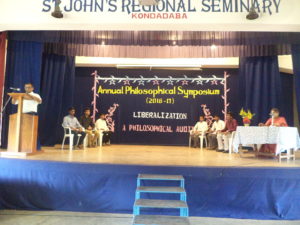
The annual philosophical symposium based on the theme of ‘Liberalization in India’ held at St John’s Regional Seminary, Kondadaba witnessed a lively intellectual fervent among the students even before it actually began. The talks and discussions carried out an audit of the ongoing phenomenon from an ecological and political perspective, with alternatives being proposed from the common man’s experience. The event took place on September 2, 2016 and was facilitated by Prof. Dr V.B.T. Sundari, from the Department of History, St Joseph’s College, Waltair.
There was much preparation, during the run-up to the event, by way of conscientizing the entire community, through well-prepared bulletin-boards, with data on Globalization, Liberalization and Privatization. The seminarians were also assisted in reading the pertinent material, ahead of the symposium. The members on the staff, had taken some pains to ensure that the speakers delivered the speeches, than just read them. It was an exercise in helping the seminarians, to stretch themselves, towards tapping their potential to the maximum.
The audio-visual presentations which included excerpts from the interview of Mr Babu Mathew (Director – Action Aid, India) on Hard Talk (BBC) and that of Dr Vandana Shiva, Physicist and Environmental activist added greater depth to the topic. The interaction which followed the speeches and presentations gave space for a lively debate among the audience, on many issues related to the theme. However, the talks delivered by Nikhil Teja, B. Joannes, A. Sudheer, K. Murali Michael and G. Peter offered the real substance for the reflection during the symposium.
The symposium titled “Political Economy of Liberalization in India (1991 – 2016): Towards a People’s Philosophical Audit” dealt with topics related to liberalization and environment, market economy, globalization and variable options from Gandhian philosophy. It commenced at 09.15 am and concluded by lunch time. Dr Sundari, with her vast wealth of knowledge and experience, offered great quality to the academic enterprise. Her cascading clarity and immense erudition were reflected in her interventions, especially her concluding speech.